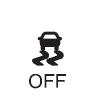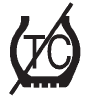Chevrolet Cruze Owners Manual: Traction Control System (TCS)
The vehicle has a Traction Control System (TCS) that limits wheel spin.
On a front-wheel-drive vehicle, the system operates if it senses that one or both of the front wheels are spinning or beginning to lose traction. When this happens, the system brakes the spinning wheel(s), and/or reduces engine power to limit wheel spin.
The system may be heard or felt while it is working, but this is normal.
TCS is on whenever the vehicle is started. To limit wheel spin, especially in slippery road conditions, the system should always be left on. But, TCS can be turned off if needed.

TCS/StabiliTrak Light
 flashes to indicate that the traction
control system is active.
flashes to indicate that the traction
control system is active.
If there is a problem detected with TCS, SERVICE TRACTION CONTROL and SERVICE STABILITRAK may be displayed on the Driver Information Center (DIC).
When this message is displayed and d comes on and stays on, the vehicle is safe to drive but the system is not operational.
Driving should be adjusted accordingly.
If  comes on and stays on, reset the
system:
comes on and stays on, reset the
system:
1. Stop the vehicle.
2. Turn the engine off and wait 15 seconds.
3. Start the engine.
If  still comes on and stays on at
a speed above 20 km/h (13 mph), see your dealer for service.
still comes on and stays on at
a speed above 20 km/h (13 mph), see your dealer for service.
A chime may also sound when the light comes on steady.
Notice: Do not repeatedly brake or accelerate heavily when TCS is off. The vehicle's driveline could be damaged.

TCS/StabiliTrak Button
 is located on the console.
is located on the console.

TCS Off Light
TCS can be turned off by pressing and releasing
 . When TCS is turned off,
. When TCS is turned off,
 comes on and the system will not limit
wheel spin.
comes on and the system will not limit
wheel spin.
Driving should be adjusted accordingly. Press and release
 again to turn the system back on.
again to turn the system back on.
It may be necessary to turn the system off if the vehicle gets stuck in sand, mud, or snow and rocking the vehicle is required. If cruise control is being used when TCS activates, cruise control will automatically disengage. Press the cruise control button to reengage when road conditions allow.Adding non-GM accessories can affect the vehicle's performance.
 StabiliTrak® System
StabiliTrak® System
The vehicle has a vehicle stability enhancement system called StabiliTrak. It
is an advanced computer controlled system that assists with directional control
of the vehicle in difficult driving co ...
Other materials:
Power Steering
Specifications
Power Steering System Bleeding
Note:
Use clean, new power steering fluid type only. See the Maintenance
and Lubrication subsection for fluid specifications.
Hoses touching the frame, body or engine may cause system noise.
Verify that the hoses do not touch any ot ...
Ignition Positions (Keyless Access)
The vehicle has an electronic keyless ignition with pushbutton start.
Pressing the button cycles it through three modes, ACC/ACCESSORY, ON/RUN/START,
and Stopping the Engine/OFF.
The transmitter must be in the vehicle for the system to operate.
If the pushbutton start is not working, the vehi ...
Front Seat Cushion Cover and Pad Replacement
Removal Procedure
Warning: Refer to SIR Warning in the Preface section.
Warning: Replace the passenger presence system as a complete assembly to prevent
possible injury to the occupant. The bladder, the
pressure sensor, the seat cushion, and the control module are assembled and
calibrated a ...

